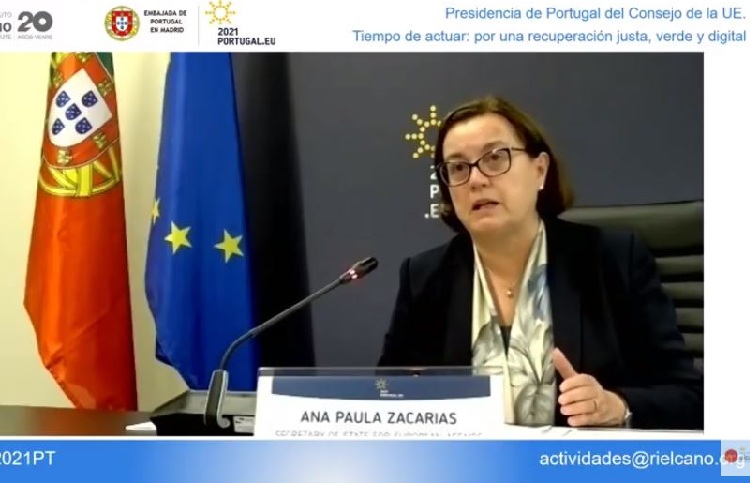Eduardo González
Economic recovery “anchored in the green and digital transitions”, vaccinations against COVID-19, strengthening the European Social Pillar and reinforcing strategic autonomy “without protectionism” are the main priorities of the fourth Portuguese Presidency of the EU Council, which will also be marked by the forthcoming arrival of Joe Biden at the White House.
“The happy coincidence between the Portuguese Presidency and the celebration of the 35th anniversary of the simultaneous accession of Portugal and Spain to the then European Community encourages us and gives us strength” to face the challenges, said the Portuguese Secretary of State for European Affairs, Ana Paula Zacarias, during her participation in the telematic event Portuguese Presidency of the Council of the EU. Time to act: for a fair, green and digital recovery, organised by the Elcano Royal Institute and the Portuguese Embassy.
“We are starting the fourth Portuguese Presidency at an extremely difficult time, with the biggest economic and health crisis since the Second World War, but we are also doing so encouraged by the ability to work together with all the Member States to achieve results and for citizens to see the value of the EU”, Zacarias continued during the meeting, which was presented by the Portuguese Ambassador to Spain, João Mira-Gomes, and the President of the Elcano Royal Institute, Emilio Lamo de Espinosa, and moderated by the Director of this think tank, Charles Powell.
According to the Secretary of State, the German Presidency carried out “extraordinary work” in areas such as the management of Brexit and the vaccines against COVID-19, and helped “European leaders and the European Parliament to take very important decisions on the financial and budgetary matters of the Union and on the creation of a recovery and resilience mechanism with a sufficient amount of money to overcome the crisis”.
“We already have the financial instruments, now it is a matter of implementing everything”, she continued. Economic recovery, Zacarias said, is “the top priority” of the Presidency, but for this to happen, “national recovery and resilience plans must be completed, so that they can be approved by the Commission and the Council and so that we can make a first payment in June”. “Without these national plans in place”, she warned, “it will be very difficult to address the tremendous economic, financial and social difficulties of the third wave” of the pandemic. The other major priority, she added, is the “implementation and monitoring” of COVID-19 vaccinations “for the health of citizens and so that borders can be opened and the internal market can function”.
With regard to relations with the future US administration, Zacarias said that “the EU has already presented a new transatlantic agenda that it would like to develop with the United States”. “Biden has given signs of being available to start working on this agenda, but it is not clear that this will happen in the first half of the year, because the internal agenda is going to require a lot of time”, she admitted. However, she said, “the Portuguese Presidency would very much like to have a first meeting with Biden, taking advantage of a possible trip to Brussels for a NATO meeting or combining us so that he can come to Brussels during this six-month period”.
At this meeting, she explained, the two parties could “begin to talk about issues such as security and defence, foreign policy or the technology agenda, defending the interests of the EU but also launching a bridge of cooperation with the United States”. It would also address “the trade agenda, because we need to sit down at the table and start working clearly and in the multilateral framework for WTO reform, which has been greatly weakened by the position of the United States”, she added. Furthermore, “it is important that the EU, the United States with Biden and China are on the same line of strengthening multilateralism” to work in this direction “in our trilateral relationship”.
With regard to other international issues, the Secretary of State assured that Portugal and Spain are “very united” in favour of European policy towards Latin America, “the region closest to Europe and with which we should have many more bridges and more empathy”. She also said that the EU’s High Representative for Foreign and Security Policy, Josep Borrell, and the European External Action Service (EEAS) should play a “central coordinating role” in European policy towards Venezuela in order to “avoid cacophony” between the different member states. “In the Council this cacophony occurs, but the image from outside must be one of coordination” so that the EU can “promote all possible avenues of dialogue that will allow a solution to be found”, she concluded.







